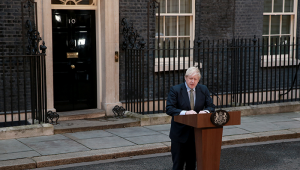By David Williams
15 March 2010
Modest investment in education could improve social mobility and help raise gross domestic product by up to £140bn a year over the next 40 years, think-tank research has shown.
A study commissioned by the Sutton Trust revealed that failing to reduce the gap in educational achievement between rich and poor could cost the country up to £1.3trillion by 2050.
The mobility manifesto, published today, says that even if the gap is not closed completely, raising social mobility to Finnish standards could still raise GDP by £56bn a year in today’s money.
James Turner, policy director at the Sutton Trust, told Public Finance: ‘This shouldn’t necessarily just benefit the private sector, it should benefit the whole economy. The more earnings you have, the more tax you have coming in to fund public services.
‘This paper is not about spending more money but spending more cleverly.’
But Turner said the government might have to reconsider the principle of universal access to services if it is to invest sufficiently in the most deprived.
‘Everybody has a right to services but in a very difficult public spending climate it’s important to spend money where it makes the most difference.
‘In childcare and early years education, the evidence shows that the more you can give to disadvantaged young people, the more impact it has. In an ideal world, provide it for everybody but in these difficult times, we do have to prioritise.
The research says many effective policies can be funded through existing budgets, and the Sutton Trust pledges to pilot six initiatives itself.
These include university access programmes to help disadvantaged pupils through the admissions process, summer camps for primary school children and individual teaching for bright pupils who are less well-off.
The trust also recommends redirecting £150m away from the government’s Connexions careers centres and into a more tailored service more closely linked with schools.
Trust chair Sir Peter Lampl said the UK’s low levels of social mobility ‘is costing us vastly in financial terms and represents a tremendous waste of talent’. He underlined the importance of tackling the issue while other countries were investing in increasing university participation, and added: ‘Their gains could be our loss.’
15 March 2010
Modest investment in education could improve social mobility and help raise gross domestic product by up to £140bn a year over the next 40 years, think-tank research has shown.
A study commissioned by the Sutton Trust revealed that failing to reduce the gap in educational achievement between rich and poor could cost the country up to £1.3trillion by 2050.
The mobility manifesto, published today, says that even if the gap is not closed completely, raising social mobility to Finnish standards could still raise GDP by £56bn a year in today’s money.
James Turner, policy director at the Sutton Trust, told Public Finance: ‘This shouldn’t necessarily just benefit the private sector, it should benefit the whole economy. The more earnings you have, the more tax you have coming in to fund public services.
‘This paper is not about spending more money but spending more cleverly.’
But Turner said the government might have to reconsider the principle of universal access to services if it is to invest sufficiently in the most deprived.
‘Everybody has a right to services but in a very difficult public spending climate it’s important to spend money where it makes the most difference.
‘In childcare and early years education, the evidence shows that the more you can give to disadvantaged young people, the more impact it has. In an ideal world, provide it for everybody but in these difficult times, we do have to prioritise.
The research says many effective policies can be funded through existing budgets, and the Sutton Trust pledges to pilot six initiatives itself.
These include university access programmes to help disadvantaged pupils through the admissions process, summer camps for primary school children and individual teaching for bright pupils who are less well-off.
The trust also recommends redirecting £150m away from the government’s Connexions careers centres and into a more tailored service more closely linked with schools.
Trust chair Sir Peter Lampl said the UK’s low levels of social mobility ‘is costing us vastly in financial terms and represents a tremendous waste of talent’. He underlined the importance of tackling the issue while other countries were investing in increasing university participation, and added: ‘Their gains could be our loss.’



















